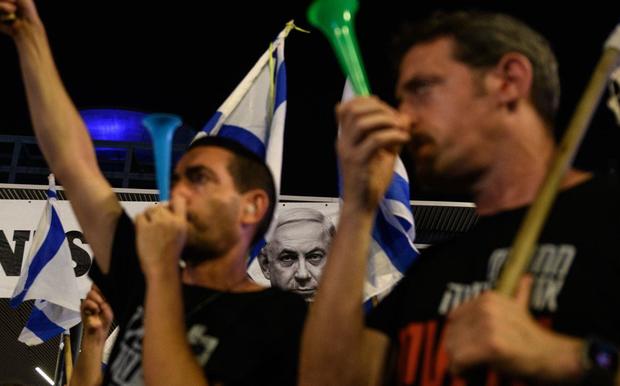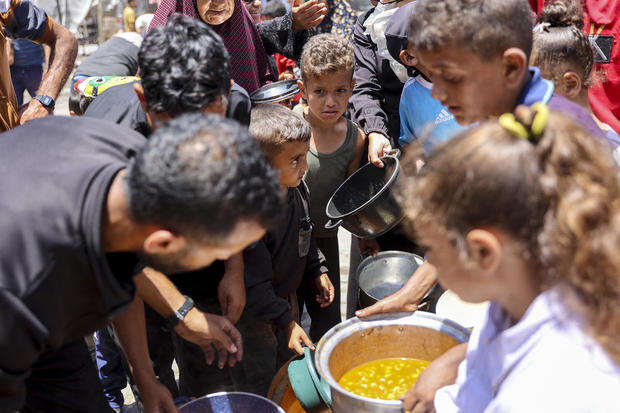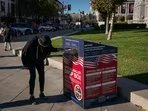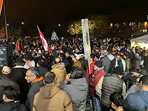Israeli leader dissolves war cabinet after political rival walks out, citing lack of plan for Gaza's future
Political tension in Israel over the conduct of the country's war against Hamas in the Gaza Strip spilled out into public view again Monday. Prime Minister Benjamin Netanyahu disbanded an influential group that had, since Hamas launched its Oct. 7 terrorist attack and sparked the war, helped to set Israel's war policy.
Netanyahu dissolved the war cabinet, a coalition of political rivals created after the Hamas attack to both sow and show unity at the top level of the Israeli government during the conflict.
That unity collapsed last week when Benny Gantz, Netanyahu's leading moderate opponent, resigned from his position in the government and the war cabinet over what he had said was a failure to present any plan to govern Gaza following the war.

The now-dissolved war cabinet was also formed to bypass some far-right ministers in the wider cabinet, and many people inside and outside Israel feared Netanyahu would lurch toward the far-right in the wake of Gantz's move. Netanyahu formed his current coalition government — Israel's most extreme right-wing cabinet ever — with members of far-right Israeli parties who remain in key posts, and those figures are the linchpin of his ongoing ability to govern effectively, and even to keep his job.
- Increasing Israel-Hezbollah clashes stir U.S. fear of wider conflict
Officials with Netanyahu's Likud party said Monday that the prime minister was forming a new small group with whom to consult on war-time decisions. Sources indicated that the extreme far-right government ministers still would not participate in the day-to-day running of the war, but major policy decisions related to the conflict will still be taken by the wider Israeli security cabinet, which includes the far-right members.
The shakeup at the top came a day after Israel announced a "tactical pause" in the fighting along a roughly 7.5-mile stretch of road in the Rafah area. The pause will take effect during daylight hours, and only on that particular road near the southern Gaza city, which has seen serious fighting in recent weeks as Israel goes after what it says are the few remaining Hamas combat units in the Palestinian enclave.
The Israel Defense Forces said the pause was intended to allow more humanitarian aid to flow into Gaza through the vital Rafah border crossing with Egypt and then to be distributed by the United Nations and other organizations further north in the territory.
After the military announced the plan, Netanyahu's office issued a statement stressing that combat operations against Hamas would continue in Rafah city and elsewhere across Gaza.
The war has killed more than 37,000 Palestinians in Gaza, according to the enclave's Hamas-run Ministry of Health, and the bloodshed continued Monday as Muslims around the world marked the holiday of Eid al-Adha. It was a muted holy day for thousands of displaced Gazan families, including one that spoke with CBS News' team in Gaza as they took refuge in a stable.
"Our hearts break when we hear of people eating Eid sweets," the grandmother told our team. "We don't even have shoes. I couldn't take anything with me but my disabled daughter and my newborn grandchild. I feel paralyzed, like I am dead."

The Biden administration and Israel accuse Hamas of stalling on an agreement to secure the release of more than 70 hostages still believed to be held alive in Gaza, along with the remains of about 30 others, in exchange for a cease-fire. Hamas, the U.S. said last week, has demanded a number of changes to the current draft proposal on offer, some of which Secretary of State Antony Blinken said were not acceptable.
If the newly announced daily pause in fighting along the key road across southern Gaza holds, it could at least help to address some of the overwhelming humanitarian needs of the Palestinian territory's people, as Israeli forces continue to pursue the remaining Hamas brigades in Rafah.
But the fighting all around that road in Rafah looked set to continue. Eight Israeli soldiers were killed over the weekend when their armored vehicle was struck by an explosion in the area.
In central Gaza, meanwhile, nine people were killed late Sunday night when a home was struck by Israeli fire. The tactical pause does not apply there, and the fighting goes on.
- In:
- War
- Hamas
- Israel
- Cease-fire
- Gaza Strip
- Rafah
- Middle East
- Benjamin Netanyahu

Chris Livesay is a CBS News foreign correspondent based in Rome.
TwitterDisclaimer: The copyright of this article belongs to the original author. Reposting this article is solely for the purpose of information dissemination and does not constitute any investment advice. If there is any infringement, please contact us immediately. We will make corrections or deletions as necessary. Thank you.
Title:Israeli leader dissolves war cabinet after political rival walks out, citing lack of plan for Gaza's future
Url:https://www.investsfocus.com









